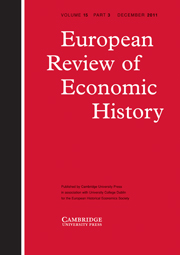Crossref Citations
This article has been cited by the following publications. This list is generated based on data provided by
Crossref.
Hautcoeur, Pierre-Cyrille
2004.
Efficiency, competition, and the development of life insurance in France (1870–1939).
Explorations in Economic History,
Vol. 41,
Issue. 3,
p.
205.
Hautcoeur, Pierre-cyrille
2005.
The Economics of World War I.
p.
169.
Hallwood, Paul
MacDonald, Ronald
and
Marsh, Ian
2011.
Remilitarization and the End of the Gold Bloc in 1936.
De Economist,
Vol. 159,
Issue. 3,
p.
305.
Ritschl, Albrecht
2012.
The German transfer problem, 1920–33: a sovereign-debt perspective.
European Review of History: Revue europeenne d'histoire,
Vol. 19,
Issue. 6,
p.
943.
Pittaluga, G. B.
and
Seghezza, E.
2012.
The role of Rentiers in the stabilization processes of the 1920s.
European Review of Economic History,
Vol. 16,
Issue. 2,
p.
188.
Bignon, Vincent
2013.
Le sens de « l'Empire » : monnaie, marchés financiers et mimétisme.
Cahiers d'économie Politique,
Vol. n° 64,
Issue. 1,
p.
253.
Krugman, Paul
2014.
Currency Regimes, Capital Flows, and Crises.
IMF Economic Review,
Vol. 62,
Issue. 4,
p.
470.
Seghezza, Elena
and
Morelli, Pierluigi
2014.
Conflict inflation and delayed stabilization.
Journal of Macroeconomics,
Vol. 39,
Issue. ,
p.
171.
Monnet, Éric
2015.
Monnaie et capital Contributions du Capital au XXIe siècle à l’histoire et à la théorie monétaires.
Annales. Histoire, Sciences Sociales,
Vol. 70,
Issue. 01,
p.
35.
Herlin-Giret, Camille
2017.
L’état et la richesse.
Gouvernement et action publique,
Vol. VOL. 6,
Issue. 3,
p.
37.
FARQUET, CHRISTOPHE
2018.
Capital Flight and Tax Competition after the First World War: The Political Economy of French Tax Cuts, 1922–1928.
Contemporary European History,
Vol. 27,
Issue. 4,
p.
537.
Monnet, Eric
2019.
Handbook of Cliometrics.
p.
1.
Monnet, Eric
2019.
Handbook of Cliometrics.
p.
1023.
Bignon, Vincent
and
Sicsic, Pierre
2022.
Quelles leçons de l’histoire ? ou comment faire face aux fortes augmentations de dette publique ?.
Revue d'économie financière,
Vol. N° 146,
Issue. 2,
p.
41.
Espic, Aurélien
2022.
A Safe Asset Interpretation of the Poincare Stabilization (1926-1929).
SSRN Electronic Journal ,
Rabault-Mazières, Isabelle
2023.
Tax Evasion and Tax Havens since the Nineteenth Century.
p.
337.
Espic, Aurélien
2023.
Public debt as private liquidity: the Poincaré experience (1926–1929).
Financial History Review,
Vol. 30,
Issue. 3,
p.
308.




